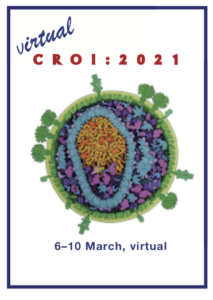No differences in outcomes among women with and without HIV with high-risk pregnancies and COVID-19
1 June 2021. Related: Conference reports, Pregnancy, COVID-19: pathogenesis, COVID-19.
 Polly Clayden, HIV i-Base
Polly Clayden, HIV i-Base
In a cohort of high-risk pregnant women with COVID-19 in South Africa, there were no clinical differences in outcomes between women with HIV (where the majority had undetectable viral load) and without HIV. These data were presented at CROI 2021.
In South Africa, pregnancies are considered high-risk if the woman requires specialist care. Common conditions include: diabetes, hypertensive disorders, obesity, multiple previous Caesarean sections, multiple pregnancies and other indications for preterm delivery.
There are limited data from African countries reporting the outcomes of COVID-19 in pregnancy, particularly for women with high-risk pregnancies and those living with HIV.
This observational study looked at the clinical features, maternal and birth outcomes of COVID-19 high-risk pregnancies. It also assessed whether risk factors for severe disease and adverse COVID-19 differed in pregnant women with and without HIV.
Tygerberg Hospital is a large public referral hospital in Cape Town that manages high-risk pregnancies. Twenty percent of women managed at the hospital are living with HIV and there is a vertical transmission rate of less than 1%. At the start of the COVID-19 epidemic, a dedicated obstetric unit was set up to care for women with suspected and confirmed COVID-19.
The investigators prospectively collected data pregnant from women with COVID-19 attending the high-risk obstetric service, between 1 May 2020 and 31 July 2020. The women were followed until 30 October 2020 to allow for all pregnancies to deliver.
One hundred pregnant women were enrolled, including 28 with HIV, of which, all but one were receiving ART and 19 (73%) had viral load <50 copies/mL.
Overall, the women were a median age of 31 years of age and the women with HIV a median of 34 years. Of note, 75% of the cohort were obese or morbidly obese. Other frequent risk factors were chronic and gestational hypertension, diabetes mellitus and gestational diabetes – these were no different in women with and without HIV.
Most women (81%) were diagnosed with COVID-19 in the 3rd trimester and 50% delivered within two weeks of their diagnosis. The most common presenting symptoms were coughing (77%), dyspnoea (49%) and fever (36%) – again these were no different for women with and without HIV. Forty per cent of women needed supplementary oxygen and 15% were admitted to the ICU.
Almost half (49%) of the women had a Caesarean section – the rate was higher in those with HIV (68%) than those without (42%), p= 0.019. This higher rate was mostly associated with having two or more previous Caesarean sections.
Eight women died of COVID-9, two with and six without HIV. Six died because of respiratory failure and one advanced HIV (and she had stopped taking ART).
When the investigators compared the outcomes for women delivering with COVID-19 to all other pregnant women delivering at the hospital during the study period, maternal deaths were significantly higher among those with COVID-19: 8.8% vs 0.2%, p<0.001. There were no differences across other key obstetric indicators (multiple pregnancies, Caesarean sections, stillbirth or low birth weight infants).
There were 91 live births, 30% delivered before 37 weeks and the rate of low birth weight was 28% – this proportion is similar to the rest of the obstetric population at Tygerberg Hospital. There was one neonatal death from complications related to perinatal asphyxia. Otherwise, neonatal outcomes were good.
comment
This is the first study from sub-Saharan Africa to look at the impact of COVID-19 in high-risk pregnant women.
A third of the cohort were living with HIV but there were no differences by HIV status in the mothers or infants.
High BMI, chronic hypertension and diabetes were common in these high-risk pregnancies.
Women were severely ill with COVID-19 and the maternal mortality rate was high. Infant outcomes were no different to background in this population.
Reference
De Waard L et al. COVID-19 infection in high-risk South African pregnancies with and without HIV. CROI 2021 (virtual). 6–10 March 2021. Oral abstract 171.
https://www.croiconference.org/abstract/covid-19-infection-in-high-risk-south-african-pregnancies-with-and-without-hiv/ (abstract)
http://www.croiwebcasts.org/p/2021croi/croi/171 (webcast)
This report was first published on 28 May 2021.

